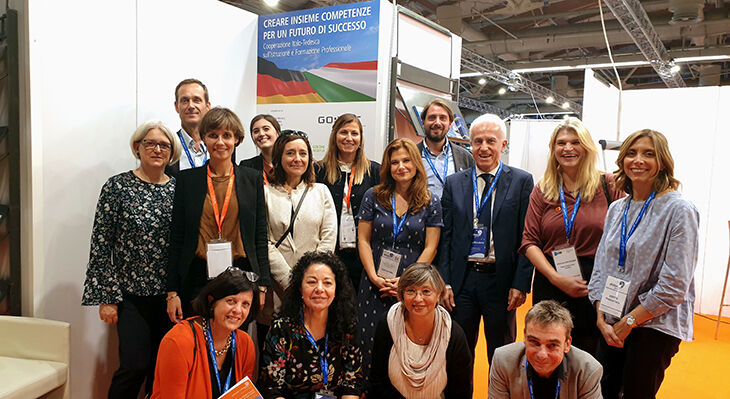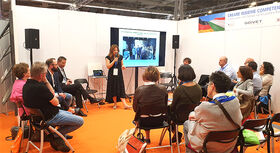German and Italian Vocational Education and Training Engage in Networking at the 2019 didacta Italia
A partner stand organised by GOVET on behalf of the BMBF at the 2019 didacta Italia in Florence made a successful contribution to German-Italian vocational education and training cooperation. It was the stand’s second appearance at the fair. It provided information on dual training as well as staging a number of workshops which mainly centred on the topics of vocational orientation and training partnerships.

GOVET, the German Chamber of Commerce and Industry in Italy (AHK Italia), the Italian Goethe Institute and the trade union project Unions4VET informed, discussed and networked on German vocational education and training and bilateral projects in the neighbourhood of the Italian Ministry of Education (MIUR). At the fair’s opening ceremony, the new Italian Minister of Education Lorenzo Fioramonti stressed the enormous importance of the educational sector for the future of Italy and of Europe. Considerable significance was accorded to the central role played by the transition from school to work and to the German training system model. Italy devoted a great deal of attention to the third didacta in Florence. It used the platform as a national education summit, and the policy background to the fair made strong references to Germany.
Italian Trade and Industry Meets Education at the edubiz

This year’s didacta Italia was also the first to offer a targeted event format for small and medium-sized companies. High ranking representatives from associations, institutions and companies used the debate surrounding digitalisation as a starting point to talk about their experiences and activities in relation to securing a supply of skilled workers. Sara-Julia Blöchle, who is in charge of BMBF’s cooperation with Italy at GOVET, presented current developments in the German VET system and the latest findings to emerge from BIBB’s research activities into digitalisation.
Focusing on Mobility – Workshop on German-Italian Vocational School Partnerships
This year, GOVET laid down a further important marker for VET cooperation between the two countries by staging a lively and highly productive networking workshop on German-Italian vocational school partnerships. Representatives of Italian and German partner schools, who had met a few years ago via a school partner exchange of the Goethe-Institut Italy, reported on enriching experiences, operational challenges and joint problem solutions with regard to the application, implementation and fit within the framework of their exchange experiences.

The experiences of the German-Italian partnerships show that major differences continue to exist in vocational training for young people. Only about 1% of pupils in Italy currently undergo training within the framework of a dual vocational model. For this reason, most of the vocational school partnerships with Germany (still) involve Italian secondary schools which provide full-time school education and training. Such establishments mainly teach general subjects leading to the upper secondary school-leaving certificate and do not maintain fixed training partnerships with companies. In practical terms, there is usually a need to start by allaying the fears Italian employers have about taking on German trainees and then getting them to perform “proper” skilled tasks. By the same token, neither is it easy to persuade companies providing training in Germany to allow Italian pupils to undertake work experience for a certain given period. The Friedrich List Vocational School in Hamm has found a convincing solution that is helping to overcome this challenge. It permits trainees to assume some degree of responsibility for organising the work they carry out together at the company.
Our suggestion to the companies providing training was that German trainees should act as mentors to the Italian exchange pupils, and this approach has been working out extremely well ever since.
Markus Silitto, Erasmus+ representative at the Friedrich List Vocational School in Hamm
Markus Silitto went into greater detail on this: “Such an approach allows trainees to reduce costs for the companies providing training whilst at the same time also enabling them to acquire important basic skills for their own professional future. They are taught how to plan and take on responsibility and even learn how to explain occupational practice in English. They obtain intercultural competencies and gain many other benefits besides!” One key task for the future will be to use the experiences gleaned to maintain bilateral networking ties on an ongoing basis whilst continuing to highlight the general conditions that apply in both countries.